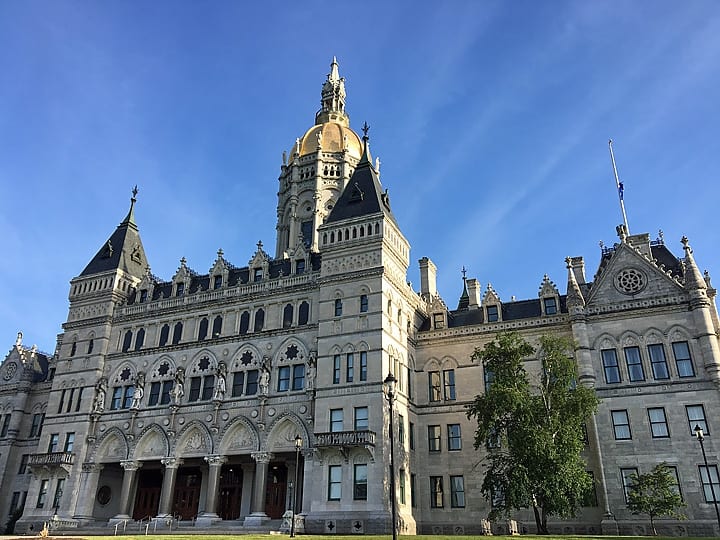Affordable Housing Bills Advance with Some Changes

Audio By Carbonatix

State Capitol. CTNewsJunkie.com file photo (courtesy)
West Hartford passed its own bill legalizing accessory dwelling units in all zones in January, but a bill legalizing them statewide was passed out of a legislative committee on party lines, as did a bill requiring municipalities to plan and zone for affordable housing.
By Kristina Vakhman, CTNewsJunkie.com
Two pieces of legislation aimed at reforming local zoning laws made it out of a key legislative committee last week, in a step proponents hope will help address Connecticut’s affordable housing shortage.
The affordable housing bills were the main focus of a March public hearing that lasted 24 hours and saw 340 people signed up to testify.
The Planning and Development Committee approved the legislation after scrapping a contentious provision that would have allowed developers to build multi-family housing near transit stations and commercial corridors without seeking approval from local officials.
Why Experts, Advocates Say Connecticut Has An Affordable Housing Crisis
Connecticut is one of the wealthiest states in the country, but it also has one of the nation’s highest gaps in income equality. Coupled with a shortage of affordable housing, lower-income households – mainly Black and Hispanic – often find it difficult to move to areas with better job and educational opportunities.
“There’s not enough housing for people to have good choices,” DesegregateCT founder Sara Bronin said.
Bronin and other advocates of changing Connecticut’s housing policies say the state has a geographical segregation that was a deliberate outcome of the Depression Era. Through redlining, Connecticut packed its communities of color into “undesirable zones” and barred them from buying homes in white neighborhoods. Advocates say that left communities of color without critical funding for education and infrastructure for decades.
Towns like Glastonbury, Farmington and Avon remain over 80% white due to the long-standing consequences of redlining.
Connecticut has been slow to address its housing issue, in part because municipalities are protective over their local zoning laws. As a result, many past proposals have died without a vote by the legislature. But complaints against the state’s affordable housing rules, coronavirus evictions and the Black Lives Matter movement have shined a new light on what advocates believe are discriminatory practices.
“There’s a real understanding that we have to do something,” said Erin Boggs, executive director of the Open Communities Alliance.
A group of Hartford residents, represented by the OCA in an ongoing class action lawsuit, have alleged that state and federal policies are “perpetuating segregation” by concentrating affordable housing. Section 8 vouchers can be used in racially segregated neighborhoods like North Hartford instead of places like Farmington or Glastonbury, the complaint alleged.
Boggs hopes lawmakers will pass the legislation requiring municipalities across the state to provide adequate affordable housing and give more opportunity for families to move into areas with a higher quality of life.
The problem stems from the lack of multi-family dwellings in the state. Connecticut sets aside 90% of its zoned land for single-family homes, according to Bronin. These houses are virtually inaccessible to lower-income families, as they’re more expensive, and more of them means that the state’s housing supply isn’t meeting its demand.
This has made things especially rough for residents who have lost their jobs or been evicted during the coronavirus pandemic.
“Not only do we have higher unemployment and very little housing being produced, but we’re not doing anything about it,” Bronin said. She said the committee’s change to the provision on multi-family housing near transit stations and commercial corridors left “unfinished business.”
‘The Reasons For Reform Go Beyond Equity’
For advocates, zoning reform does not mean just addressing systemic inequalities. To them, fighting the disparities in access to affordable housing will improve Connecticut’s environment and economy.
“The reasons for reform go beyond equity,” Bronin said.
Proponents claim the bills will generate billions of dollars in income for Connecticut residents, taxes for state and local governments, and encourage generational wealth. They use New Jersey as a model example. That state produced thousands of units after a ruling in 2017 dictated that communities must build affordable housing for low-income and poor families.
There is also an environmental component. Multi-family dwellings are more sustainable than single-family homes, as they can house more people in one property. Accessory dwelling units are environmentally efficient, too, as they’re built where housing already exists, reducing sprawl, and consume less electricity and water.
Advocates say more affordable housing would also draw more people to Connecticut. The state’s population has been decreasing since 2014, and it took a pandemic for people to move back.
“The housing burden that families in Connecticut are facing is enormous and has a huge impact on the other things they can possibly spend their money on that would really power our economy,” Boggs said. “And it’s making our state a really unattractive state for people to live and businesses to locate to.”
The population is also aging as young people choose to leave – students, for example, who cannot afford to live in-state go elsewhere.
“Whatever is the motivating factor, the important thing here is that we have an outcome, and that we have affordable housing for individuals and families so they can have more opportunity,” said former state Housing Commissioner Evonne Klein, who is also interim CEO for the Connecticut Coalition to End Homelessness.
Additionally, Klein said unaffordable housing and homelessness go hand-in-hand. Many challenges stem from homelessness. Some applications, like for a driver’s license, require an address, and children who are homeless are more likely to experience a lesser education than their peers.
“Without that housing, we can’t end homelessness,” Klein said. “When people have a home, all things come from that.”
Opponents Were Successful In Changing The Legislation
Opposition to the legislation remains strong. Both bills passed along party lines, with Republicans voting against zoning changes.
Republicans want towns to maintain complete local control over their planning and zoning. They reject what they say are attacks on the character of their municipalities. Rep. Doug Dubitsky, R-Chaplin, said the proposals are themselves propagating racism.
“The history of zoning does not mean that it is currently being used for that purpose,” Dubitsky said. “People can move where they want. Zoning is not the issue.”
Others, like Rep. Kimberly Fiorello, R-Greenwich, were happy to see the transit-oriented development provision scrapped from the bill. She called the proposal “controversial and troubling.”
“I think that’s a great relief to a lot of people who are really concerned about the impact to their towns and their inability to have any say in that,” Fiorello said.
Residents who oppose the bills also have expressed their worries that the government will make decisions for them on local issues it might not know enough about, like how more housing will affect an individual municipality’s water and sewer infrastructure.
“Local town authorities are familiar with the land and what it can support. It is best that each town be able to make proper decisions for those who live within its borders,” Suzanne Binelli of Brookfield said.
The “character” of a town is a concern for opponents as well. They say forcing affordable housing into a municipality will disrupt its atmosphere, architecture, and more.
“Housing density, land use, lot size, special use permitting, and the required public hearings need to be town decisions,” said William Grace of Windsor, who before served on East Windsor’s Planning and Zoning Board. “These very regulations have been refined and have evolved over many years. Consequences of zoning changes, both intended and unintended, have been resolved. It’s what gives each town its own personality.”
But advocates are still hopeful that the proposals are just the first step.
The Biden administration has called the country’s affordable housing situation a “crisis.” It has promised to invest $213 billion to produce, preservice and retrofit affordable and sustainable homes in the American Rescue Plan. Boggs is optimistic that means progress for the families her organization represents.
And on the state level, affordable housing is a priority for Connecticut Housing Commissioner Seila Mosquera-Bruno. She headed a non-profit dedicated to affordable housing opportunities before taking her current role.
COVID-19 has stalled the department’s efforts, Mosquera-Bruno said, but she plans on continuing to take a “proactive role” in working with municipalities, as well as the Education and Labor departments, to have an adequate inventory of affordable housing.
“If they don’t plan and they don’t look at the needs of their residents, no matter what you do, it still isn’t going to be impactful for the residents or that particular community,” Mosquera-Bruno said.
For Bronin and others, a first step means that the fight for greater access to affordable housing will continue.
“Some people are painting [the bill] as very radical, but the reality is is that it’s a modest first step to doing the things that we need to do as a state to advance the values that we all share,” Bronin said.
Republished with permission from CTNewsJunkie.com, all rights reserved.
Like what you see here? Click here to subscribe to We-Ha’s newsletter so you’ll always be in the know about what’s happening in West Hartford! Click the blue button below to become a supporter of We-Ha.com and our efforts to continue producing quality journalism.



